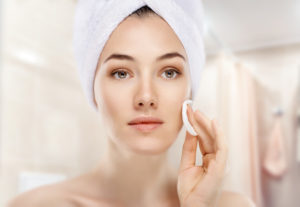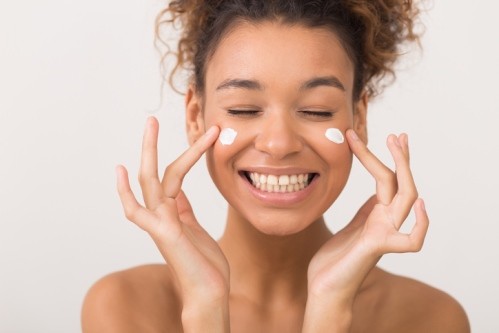
The state of emergency that forced us to stay at home for more than two months and the return to normal life on the one hand and the warming of the weather on the other affect the condition of our skin.
In summer, the heat in combination with UV rays damages and dehydrates the skin. The polluted environment increases the activity of the sebaceous glands and leads to enlarged pores, clogging with fat, causing acne, pimples, and blemishes on the skin. This makes oily skin look oilier and dry skin rough and blemished.
 Due to the warm weather, the dermatologists recommend opting for lighter cleaning products. For dry skin, use a cleanser without foam. For combination skin, a slightly more acidic product will help you control glow and sweat more effectively. To prevent excessive drying of the skin and itching on it, showers should be short, about five minutes, and with cool water.
Due to the warm weather, the dermatologists recommend opting for lighter cleaning products. For dry skin, use a cleanser without foam. For combination skin, a slightly more acidic product will help you control glow and sweat more effectively. To prevent excessive drying of the skin and itching on it, showers should be short, about five minutes, and with cool water.
Exfoliation is the key to lighter and smoother skin. A light exfoliant twice a week removes dead cells and reveals a fresher layer of skin. This reduces the appearance of acne, smoothes the overall texture of your skin, and allows better absorption of skincare products such as moisturizers and sunscreens. Look for products with salts, sugars, or enzymatic scrubs with fruit acids, such as papaya, pumpkin, or pineapple. They are more gentle on the skin, especially when it is often exposed to strong ultraviolet (UV) rays. Brushes and polishing towels offer an easy way to smooth out rough stains. Rotating cleansing brushes and microdermabrasion kits work by physically removing dead skin cells. Whether you have sensitive, dry or oily skin, use a body scrub that is made from naturally occurring ingredients such as oatmeal, sea salt, brown sugar, olive oil or coconut oil to avoid irritated skin.
 Sunscreen should be used all year round, but especially during the spring and summer months. Choose one that has a wide ultraviolet spectrum (between 30-50 SPF and protects against UVA and UVB rays). The use of sunscreen with a high SPF can reduce the accumulation of chronic UV damage, which is associated with aging and skin cancer. Accidental sun exposure, even for only 10 to 15 minutes a day, can cause significant sun damage, accelerated photoaging, hyperpigmentation, and wrinkles. Taking vitamin B3 daily improves the skin’s immunity against cancer. Also, eating boiled tomatoes, rich in the antioxidant lycopene, helps fight the effects of UV rays, such
Sunscreen should be used all year round, but especially during the spring and summer months. Choose one that has a wide ultraviolet spectrum (between 30-50 SPF and protects against UVA and UVB rays). The use of sunscreen with a high SPF can reduce the accumulation of chronic UV damage, which is associated with aging and skin cancer. Accidental sun exposure, even for only 10 to 15 minutes a day, can cause significant sun damage, accelerated photoaging, hyperpigmentation, and wrinkles. Taking vitamin B3 daily improves the skin’s immunity against cancer. Also, eating boiled tomatoes, rich in the antioxidant lycopene, helps fight the effects of UV rays, such
Antioxidants increase collagen production and remove harmful free radicals to prevent skin damage and minimize the appearance of dark spots. Regular use of an antioxidant-rich mask or serum hydrates your skin and protects it from environmental contaminants. Applying an antioxidant serum, such as vitamin C, in the morning, after cleansing the face and before applying sunscreen, helps to strengthen the skin barrier. Remember that you can include antioxidants in your diet. Stock up on citrus fruits, green and leafy vegetables, green tea, nuts, and whole grains to have younger skin.
 Hydration is always important for our skin, but even more so in the summer. Moisturizers restore the stratum corneum, the outermost layer of your skin, which protects against harmful contaminants and chemicals and prevents further irritation or dryness. Stick to lighter creams and serums in the spring and summer to keep your skin supple and healthy without clogging it with more oil. Look for products that contain moisturizing ingredients, such as hyaluronic acid, and invest in a good moisturizing mask to repair, rehydrate, and soothe your skin. Water is the most important ingredient in healthy skin tissue. Remember to bring a bottle of water and drink at least eight glasses of water a day. The required amount of water for the body is 30 ml/kg body weight. So, if you weigh 70 kg, you need 2100 ml of water per day.
Hydration is always important for our skin, but even more so in the summer. Moisturizers restore the stratum corneum, the outermost layer of your skin, which protects against harmful contaminants and chemicals and prevents further irritation or dryness. Stick to lighter creams and serums in the spring and summer to keep your skin supple and healthy without clogging it with more oil. Look for products that contain moisturizing ingredients, such as hyaluronic acid, and invest in a good moisturizing mask to repair, rehydrate, and soothe your skin. Water is the most important ingredient in healthy skin tissue. Remember to bring a bottle of water and drink at least eight glasses of water a day. The required amount of water for the body is 30 ml/kg body weight. So, if you weigh 70 kg, you need 2100 ml of water per day.
 Always check expiration dates and replace items after a few years. Remember this rule: everything you apply near the lips or eyes should be discarded after a year. On warm days, wear a minimal amount of makeup that is non-comedogenic. Switching to lighter products with SPF, such as CC cream, BB cream, fat-free primer, or mineral powder, will balance the extra fat production during the warmer months and leave your skin looking healthier. To protect your lips, always use a gloss or conditioner with SPF 15, for fresher lips. Changing your cream-based makeup remover products to a lighter version, such as micellar water, will make you feel much more refreshed during the warmer months.
Always check expiration dates and replace items after a few years. Remember this rule: everything you apply near the lips or eyes should be discarded after a year. On warm days, wear a minimal amount of makeup that is non-comedogenic. Switching to lighter products with SPF, such as CC cream, BB cream, fat-free primer, or mineral powder, will balance the extra fat production during the warmer months and leave your skin looking healthier. To protect your lips, always use a gloss or conditioner with SPF 15, for fresher lips. Changing your cream-based makeup remover products to a lighter version, such as micellar water, will make you feel much more refreshed during the warmer months.
The skin around your eyes is much thinner and more delicate than the rest of your face. Choose a good eye gel that contains hyaluronic acid, cucumber extract, or even honey. These ingredients keep the skin around the eyes hydrated and prevent the formation of wrinkles. Eye makeup is something that should be avoided in the summer.
Exfoliate the skin of your feet regularly. Use a moisturizer and sunscreen on your feet if you plan to wear open shoes.



